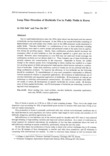Long-Time Direction of Herbicide Use in Paddy Fields in Korea
JIRCAS international symposium series
| ISSN | 13406108 |
|---|---|
| NII recode ID (NCID) | AA1100908X |

Full text
intlsymp-4_87-96.pdf346.74 KB
Due to rapid industrialization since the 1970s, farm labour has decreased and the amount of herbicide use has drastically increased. In the 1970s as the annual herbicides consisting of diphenylethers and acid amides were widely used, in the 1980s perennial weeds dominated in paddy fields. "One-shot herbicides", i.e. combinations of two or three herbicides including sulfonylureas, were used to control annual and perennial weeds at the same time by application during the growing season. Ideally, these combination products should maximize the synergistic effect of each herbicide so that the amount applied to a given area can be decreased. However, since weed species in a rice field may not need such broad coverage, the combination products are not always ideal in it. Thus, intensive use of these herbicides can actually enhance soil contamination in the long-term. Especially in Korea, the sudden change in the cultural system from transplanting to direct seeding has resulted in a longer rice growing season in fields and generated weed species which became tolerant to combinations of herbicides. Under such conditions, control of weeds can not be achieved with the existing combination products. To improve the efficiency of rice herbicide use the following should be considered; 1. reestablishment of crop-weed competitive relationship in different cultural systems (in relation to sequential application); 2. avoidance of indiscriminate use of one-shot herbicides and sequential application of herbicides; 3. development of reduced use technology to minimize environmental contamination ; 4. rotation of herbicides with different modes of action ; 5. development of specific herbicides for certain weeds ; 6. Development of foliar-applied herbicides ; and 7. development of herbicide use technology toward integrated weed management.
| Creator | Ja Ock Guh Yun-Jin Oh |
|---|---|
| Subject | direct seeding rice weed problem one-shot herbicide sequential application tank-mix IWMS rotation application |
| Publisher | Japan International Research Center for Agricultural Sciences |
| Available Online | |
| Issue | 4 |
| spage | 87 |
| epage | 96 |
| Language | eng |
